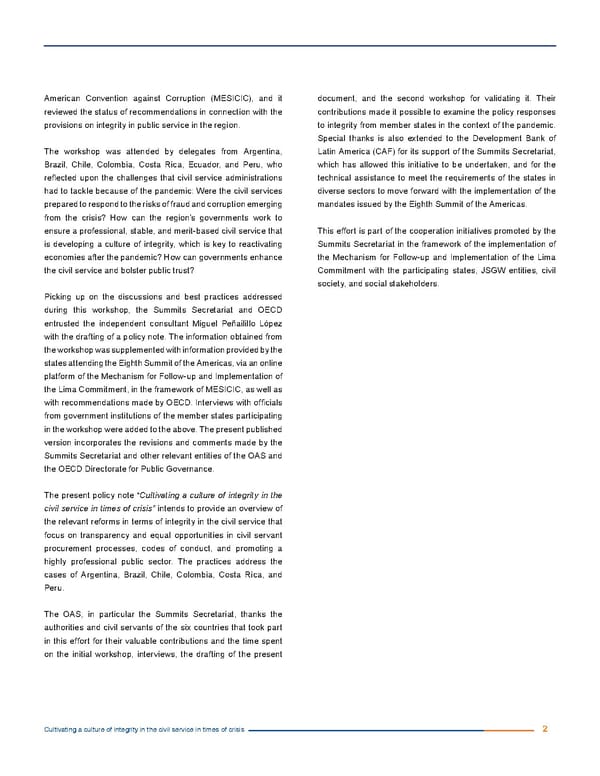American Convention against Corruption (MESICIC), and it document, and the second workshop for validating it. Their reviewed the status of recommendations in connection with the contributions made it possible to examine the policy responses provisions on integrity in public service in the region. to integrity from member states in the context of the pandemic. Special thanks is also extended to the Development Bank of The workshop was attended by delegates from Argentina, Latin America (CAF) for its support of the Summits Secretariat, Brazil, Chile, Colombia, Costa Rica, Ecuador, and Peru, who which has allowed this initiative to be undertaken, and for the reflected upon the challenges that civil service administrations technical assistance to meet the requirements of the states in had to tackle because of the pandemic: Were the civil services diverse sectors to move forward with the implementation of the prepared to respond to the risks of fraud and corruption emerging mandates issued by the Eighth Summit of the Americas. from the crisis? How can the region’s governments work to ensure a professional, stable, and merit-based civil service that This effort is part of the cooperation initiatives promoted by the is developing a culture of integrity, which is key to reactivating Summits Secretariat in the framework of the implementation of economies after the pandemic? How can governments enhance the Mechanism for Follow-up and Implementation of the Lima the civil service and bolster public trust? Commitment with the participating states, JSGW entities, civil society, and social stakeholders. Picking up on the discussions and best practices addressed during this workshop, the Summits Secretariat and OECD entrusted the independent consultant Miguel Peñailillo López with the drafting of a policy note. The information obtained from the workshop was supplemented with information provided by the states attending the Eighth Summit of the Americas, via an online platform of the Mechanism for Follow-up and Implementation of the Lima Commitment, in the framework of MESICIC, as well as with recommendations made by OECD. Interviews with officials from government institutions of the member states participating in the workshop were added to the above. The present published version incorporates the revisions and comments made by the Summits Secretariat and other relevant entities of the OAS and the OECD Directorate for Public Governance. The present policy note “Cultivating a culture of integrity in the civil service in times of crisis” intends to provide an overview of the relevant reforms in terms of integrity in the civil service that focus on transparency and equal opportunities in civil servant procurement processes, codes of conduct, and promoting a highly professional public sector. The practices address the cases of Argentina, Brazil, Chile, Colombia, Costa Rica, and Peru. The OAS, in particular the Summits Secretariat, thanks the authorities and civil servants of the six countries that took part in this effort for their valuable contributions and the time spent on the initial workshop, interviews, the drafting of the present Cultivating a culture of integrity in the civil service in times of crisis 2
 Cultivating a culture of integrity in the civil service in times of crisis. Page 9 Page 11
Cultivating a culture of integrity in the civil service in times of crisis. Page 9 Page 11